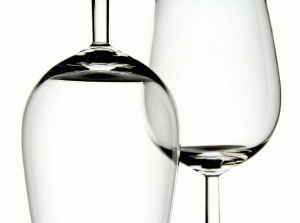 Over the years man’s choice of drinkware for enjoying wine has evolved. As early as the fifth century animal horns and sturdy pottery were used as wine glasses. Today there are no shortages of styles and quality of glasses available. The choices — stemmed or stemless, goblets or flutes, wide or narrow bowl, clear, frosted or colored glass — can be overwhelming. So it’s no surprise that for many of us selecting the right glass can be as confusing as shopping for the wine itself.
Over the years man’s choice of drinkware for enjoying wine has evolved. As early as the fifth century animal horns and sturdy pottery were used as wine glasses. Today there are no shortages of styles and quality of glasses available. The choices — stemmed or stemless, goblets or flutes, wide or narrow bowl, clear, frosted or colored glass — can be overwhelming. So it’s no surprise that for many of us selecting the right glass can be as confusing as shopping for the wine itself.
But finding the perfect glass is not as complicated as you think. There are no official rules, but taking the time to consider a few guidelines and learn how to properly care for glassware may increase your wine enjoyment.
The type of glass offers several enhancements to a wine. If the glass is clear and clean it adds to the wine’s color, an important part in the appreciation of wine.
A stemmed glass not only looks elegant, the stem provides a place to hold the glass without warming the bowl or leaving smudge marks. The bowl size allows aromas their optimal expression.
Fragile, fragrant and delicate wines such as Champagne and other sparkling wines need a small bowl and narrow body to enhance the bubbles.
White wine glasses, though larger than champagne flutes, are smaller to enhance the fragrance, but most importantly the smaller bowls allow the wine to stay cooler longer.
Red wine glasses with large, round bowls and wide rims allow more contact with air, something usually needed to fully appreciate powerful, robust styles.
Price is an obvious consideration, but don’t forget about space. The more types of glasses you invest in, the more space you will have to dedicate to storage. If space (and budget) is not an issue there are literally hundreds of styles and sizes available, even varietal-specific glasses.
But for most of us it is sufficient to have three styles: globe or balloon-shaped glasses for red wine; “tulip” shaped for white wine; and flutes for Champagne.
Although most modern wine glasses are dishwasher safe, washing them in the dishwasher may hurt the wine. All glasses contain scratches, crevices and imperfections that, though imperceptible to the naked eye, can harbor trappings of detergent that deter the aromas and appearance of a wine. Also, ‘‘rinse aids’’ add further layers of unwelcome film. The best method for cleaning wine glasses is simply a soft cloth and hot water with no soap or detergent.
Of course, in some instances use of a mild detergent, may be desired, such as when the outside of the glass becomes soiled with something such as lipstick, fingerprints or food that water alone won’t wash away. Simply use a brush and mild detergent then clean with hot water. To avoid water spots, use a soft, lint-free cloth to hand dry.